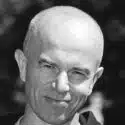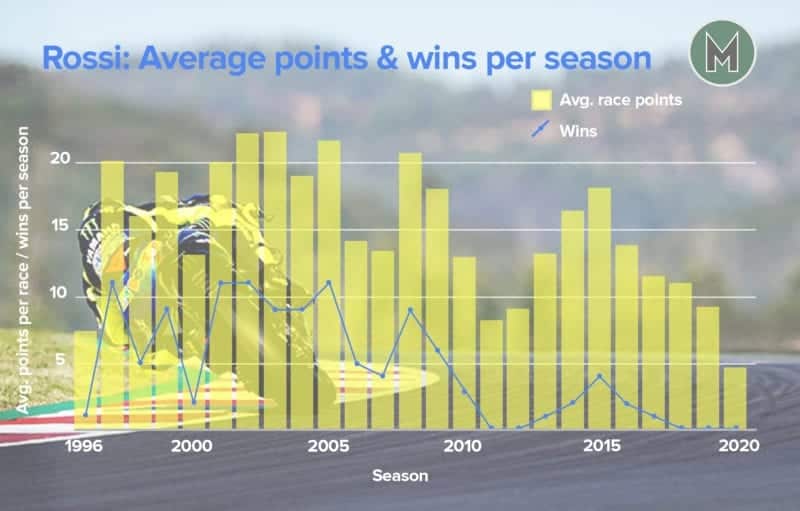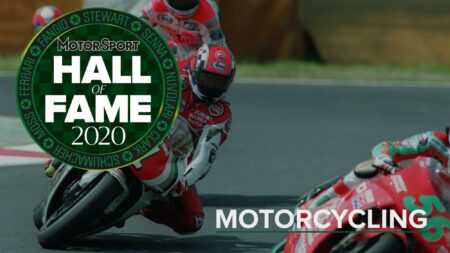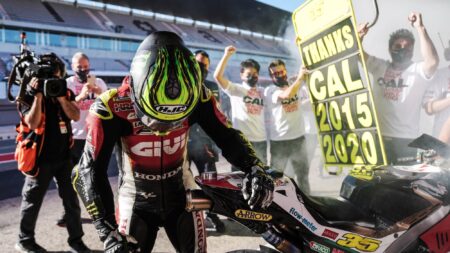On Sunday at Portimao he finished 12th, a miserable result, although the other riders using the same-spec M1s – Maverick Viñales and Fabio Quartararo – only managed 11th and 14th. And yet Rossi had a blast during the race, charging around the Portimao rollercoaster in a pack of up to eight riders, all of them ducking and diving for position throughout the 25 laps.
“I had a lot of battles and sincerely I enjoyed the race because it was a great challenge from beginning to end,” he said after his 414th grand prix. “The result isn’t fantastic but it was a better race compared to Valencia, because the difference to the top guys was a lot, lot less.”
Rossi’s previous race at Valencia had been his first finish since the San Marino GP, six races previously. After the first Misano race he crashed out at Misano Two, Barcelona and Le Mans, then he missed both Aragon rounds because he was quarantining at home. That was a long time without any real race mileage, so he was rusty.
Details like that matter when you’re racing rivals who have been riding every weekend, so they’re intimate with their motorcycles and know exactly where the limit is located.
The perennial question – should he make way for younger talent? – is a non-question. While Rossi wants to race and, just as importantly, while factories want to let him race their bikes, then he will continue to race. It really is as simple as that.
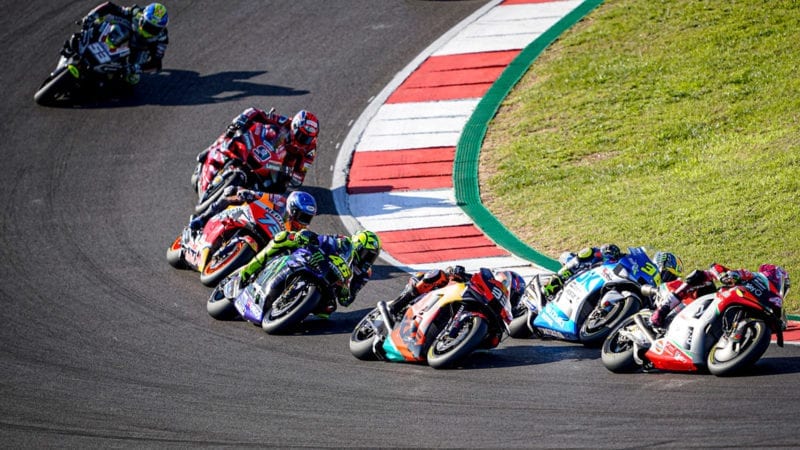
Rossi mired in the pack at Portimao, sandwiched between two rookies
Yamaha
This kind of thing has happened before. Double 500cc world champion Barry Sheene enjoyed factory support right to the end of his career in 1984, when he was way past his best. There’s little doubt that Sheene wouldn’t have been given his factory-backed Suzuki RG500 if he hadn’t been Barry Sheene.
Sheene won the 1976 and 1977 500cc world championships and hadn’t won a grand prix since the summer of 1981. During 1984 he scored just one podium, in the rain at Kyalami, South Africa. Very much like Rossi now.
Rossi and Sheene enjoy special status among motorcycle racers because their profiles are different from other racers. Their fanbase and their mainstream appeal goes way beyond the world of motorcycling, which makes them worth good money and good bikes.
If he enjoys 2021 and achieves a few podiums he may want to continue into 2022
At the start of his final grand prix season, Sheene rode his RG500 onto the stage during a primetime BBC TV show. That kind of exposure is priceless for companies trying to sell motorcycles, or anything else, for that matter. That’s just the way it is – money makes the world go around and it makes motorcycle racers go around too.
This kind of status gives a rider a special kind of power. Like Sheene, Rossi is in the lucky position of being in charge of his own destiny; up to a point, of course. So he will decide when he writes the final chapter and when the story ends.
He is already thinking hard about his 26th season of grand prix racing and how he can improve himself.
“I have to work a lot on myself to improve in some areas, like qualifying, which is so important now,” he said on Sunday afternoon.
Rossi has struggled with qualifying ever since MotoGP introduced the quickfire 15-minute qualifying format in 2013. And as the racing gets closer and more competitive, riders are usually out of the hunt unless they qualify on the front two rows. That has been a recurring problem for him during the last eight seasons.
